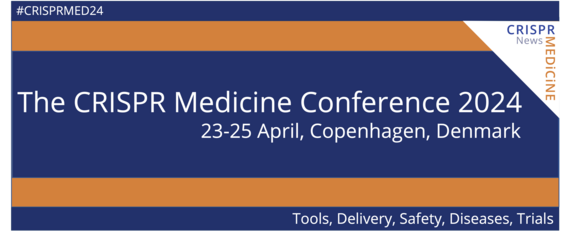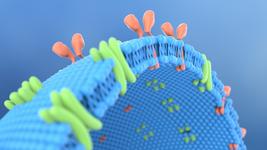CMN Weekly (19 January 2024) - Your Weekly CRISPR Medicine News
By: Karen O'Hanlon Cohrt - Jan. 19, 2024
CRISPR Medicine Conference 2024
- Early bird registration has been extended until today, January 19th 2024. Grab your seat here. See the latest conference announcements in our latest CRISPR Med newsletter.
Top picks
- A research team at the Perelman School of Medicine at the University of Pennsylvania announced yesterday the successful completion of an experiment to circulate a recently deceased donor’s blood through a genetically-engineered pig liver outside their body. The team is now planning to pursue this approach further in hopes of providing options to save more patients from dying while waiting for transplants. The procedure, which took place in December 2024, involved a living donor who had experienced brain death and whose organs were not deemed suitable for donation. The donor’s own liver was kept in place, while a CRISPR-edited porcine liver was connected to the body using blood-carrying tubes to evaluate its potential to serve as a perfusion vehicle. The porcine liver showed no signs of liver inflammation during the 72-hour study period, while the donor’s body remained physiologically very stable. Read the news release from Penn Medicine here.
Research
- Researchers in the US report that CRISPR activation reverses haploinsufficiency and functional deficits caused by TTN truncation variants (TTNtvs), which are the most common type of mutation identified in individuals with dilated cardiomyopathy, a disease with high morbidity and mortality rates. These variants reduce the normal proteins level of TTN, which contributes to the symptoms seen in affected individuals. Therapeutic targeting of TTN has been challenging owing to its large size and open questions about the pathogenicity of individual TTNtvs, some of which are rare. The team behind this study adapted CRISPR activation using a catayltically-dead Cas9 (dCas9) fused to a transcriptional activator (VPR) to functionally interrogate TTNtv pathogenicity and found that targeting of the TNN promoter or regulatory regions close to the TNN promoter could restore TTN protein deficits disturbed by TTNtvs and partially restored certain disease-associated phenotypes. The findings were published this week in Circulation.
- In a manuscript shared on the pre-print server bioRxiv, researchers at EpiCRISPR Technologies (US) and Stanford University report the results of high-throughput screens undertaken to discover novel classes of transcriptional modulators derived from thousands of human, viral, and archaeal proteomes. They identified high-potency activators capable of mitotically-stable gene activation in a multitude of cellular contexts, and leveraged machine learning models to rationally engineer variants with improved activities. In experiments involving liver- and T cells, they observed that novel hypercompact activators (derived from vIRF2 core domain) in the 64 to 98 amino acids size range yielded superior potency and durable activation lasting weeks beyond the current large activators (~five-fold larger). Targeting of a human hypercholesterolemia susceptibility gene in a humanised mouse model resulted in gene activation that persisted five weeks after a single dose delivered via lipid nanoparticles.
- A team based at CERVO Brain Research Centre in Canada report the generation of induced pluripotent stem cell (iPSC) lines from a dilated cardiomyopathy (DCM) patient carrying a mutation in the SCN5A gene, with his healthy father serving as a control. They employed CRISPR-Cas9 to correct the mutation in the patient's iPSC line, and observed that the resulting iPSC lines expressed pluripotency markers, underwent differentiation into all three embryonic germ layers, maintained a normal karyotype, and lacked reprogramming viral vectors. DCM is a prevalent cause of heart failure, and it is anticipated that these new iPSC lines could serve as a model for dissecting the mechanisms of DCM and open doors for personalised therapeutic approaches. The findings were published in Stem Cell Research.
- In an article published in Microchimica Acta, a team in China report the development of a rapid amplification-free Cas12a-based direct detection assay for Mpox virus (MPXV) DNA. Four CRISPR RNAs (crRNAs) were designed to targeting the envelope protein gene (B6R) of MPXV. Upon introduction of MPXV DNA into the reaction, each Cas12a/crRNA complex targets a different site of the same MPXV gene. This triggers the trans-cleavage activity of Cas12a to cleave the DNA reporter probes, releasing a fluorescence signal. Following optimisation, the team reported a limit of detection of ~ 0.16 pM and proposes that the assay has great potential for Mpox diagnosis.
- A team in China reports efforts to develop a rapid detection assay for the simultaneously detection of respiratory syncytial virus (RSV) and respiratory adenovirus (ADV), which are two common pathogens that cause acute respiratory tract infections in children. They developed an assay that combined the recombinase polymerase isothermal amplification (RPA) method with the CRISPR-Cas detection system and a fluoresence readout. The consistency of the test results of 160 clinical pharyngeal swab samples was studied using quantitative polymerase chain reaction (qPCR) results as a comparative control. The team found that RSV and ADV could be detected at levels as low as 104 copies/mL and 103 copies/mL, respectively, within 50 minutes and without cross-reactivity to other similar pathogens. For the clinical samples, compared with the qPCR method, the sensitivities for RSV and ADV were 98.1% and 91.4%, respectively, and the detection specificities were both 100%. Their findings were published in this week in Journal of International Medical Research.
Industry
- Vor Bio announced yesterday that it has dosed the first patient with relapsed or refractory acute myeloid leukaemia (AML) in VBP301, its Phase 1/2, multicenter, open-label, first-in-human study of VCAR33ALLO. VCAR33ALLO is a CD33-targeting CAR-T cell therapy generated from healthy cells isolated from the same donor from which the patient was previously transplanted with trem-cell (gene-edited healthy donor haematopoietic cells lacking CD33. According to a press release, the VBP301 trial is designed to test the hypothesis that a CD33-targeted CAR-T derived from a healthy donor can be safely administered to a patient with AML who has relapsed after transplant and that the CAR-T can demonstrate anti-leukaemia activity.
- Vertex Pharmaceuticals will announce fourth quarter and full year 2023 financial results on February 5th. See the company's press release for details about how to join the conference call.
- CRISPR Therapeutics announced this week that the FDA has expanded its approval of CASGEVY to the treatment of transfusion-dependent beta thalassemia. CASGEVY was approved for the treament of sickle cell disease by the FDA in December 2023. The novel CRISPR-based therapy is also approved in the UK, Bahrain, and Saudi Arabia. Read more about CASGEVY in our recent clinical update here.
- Allogene Therapeutics announced plans to participate in upcoming investor conferences in January and February 2024. See here for further details.
- ERS Genomics announced this week that it has entered a CRISPR-Cas9 licence agreement with Finnish biotech StemSight. StemSight is a pre-clinical stage company developing 'off-the-shelf' stem cell-based therapies for corneal blindness, and under the terms of the agreement, it will gain access to ERS’ CRISPR-Cas9 patent portfolio.
Reviews
- Molecular mechanisms and emerging therapies in wild-type transthyretin amyloid cardiomyopathy. This review summarises the emerging and pipeline therapies, as well as molecular mechanisms necessary for understanding and treating wild-type transthyretin amyloid cardiomyopathy.
- Non-canonical CRISPR/Cas12a-based technology: A novel horizon for biosensing in nucleic acid detection. In this review, applications of non-canonical CRISPR-Cas12a-based biosensors in nucleic acid detection are summarised. The principles, peculiarities, performances and perspectives of these biosensors are also discussed.
- Exagamglogene Autotemcel: First Approval. This article summarises the milestones in the development of exagamglogene autotemcel leading to its recent regulatory approvals.
Courses and workshops
- Aarhus University in Denmark is running a two-week long summer course in genetic engineering using CRISPR-Cas. The bachelor-level course entitles participants to 5 ECTS credits, and will be held in August 2024. See here for further details.
To get more CRISPR Medicine News delivered to your inbox, sign up to the free weekly CMN Newsletter here.
Tags
ArticleNewsCMN WeeklyAllogene Therapeutics, Inc.CRISPR Therapeutics AGERS GenomicsVertex Pharmaceuticals, Inc.Vor Biopharma
CLINICAL TRIALS
IND Enabling
Phase I
Phase II
Phase III
Chronic Granulomatous Disease, CGD, (NCT06325709)
Sponsors:
National Institute of Allergy and Infectious Diseases (NIAID)
Sponsors:
National Institute of Allergy and Infectious Diseases (NIAID)
IND Enabling
Phase I
Phase II
Phase III
IND Enabling
Phase I
Phase II
Phase III







